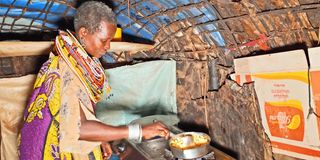Premium
Biogas cheaper, friendlier

Katelina Lekanta cooks using the biogas in her Manyatta at Archer's Post in Samburu County. She uses cow dung from her cattle to make the gas.
Cooking is a fundamental human activity, not only for being a means of preparing meals but also as a social and cultural practice.
But traditional methods, characterised by open-fire stoves and inefficient charcoal stoves, have had detrimental effects on human health and the environment; hence the urgent need for improved and clean cooking technologies to address their inefficiencies and challenges.
With the escalating costs of liquefied petroleum gas (LPG) and traditional fuel sources, putting a significant strain on the nation’s and household budgets, it is time to consider viable alternatives that provide relief and pave the way for a sustainable future. And embracing the production of biogas is so far the best solution to the energy challenges.
First, the government should initiate a comprehensive campaign targeting schools, with educators and administrators highlighting the numerous benefits of biogas. Biogas can significantly reduce energy expenses for schools, freeing up resources to be redirected towards improving the learning facilities.
Collaborative partnerships between the government, private sector and non-governmental organisations can offer vital technical expertise and guidance on biogas plant installation and maintenance. Let policymakers prioritise development of renewable energy sources and create an enabling environment for investment in biogas technology through incentives, subsidies and favourable regulations.
By actively embracing biogas and investing in its development, Kenya can reduce its dependence on costly fuel imports, alleviate energy poverty and contribute to a greener and more sustainable future. The time to embrace biogas as a renewable energy solution is now. Responsible consumption and waste management can help us to produce the affordable clean energy.
Mr Ngotiek ([email protected]) and Ms Afandi ([email protected]) journalism and communication students at Rongo University.



